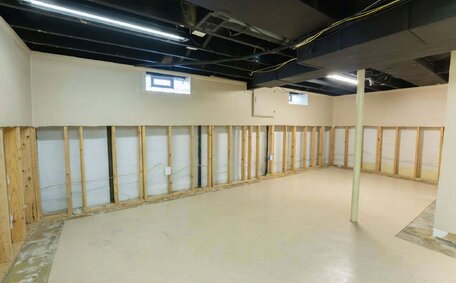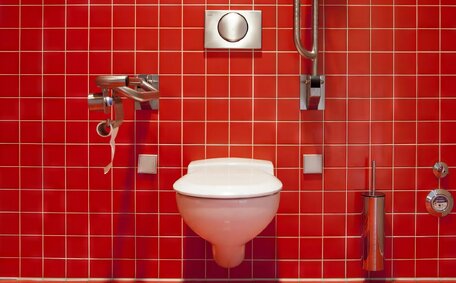Buildup of Organic Matter
Hair, soap scum, food scraps, oils, and fats commonly accumulate, causing smelly drains. This organic debris accumulates in pipes and traps over time, fostering bacteria growth and potentially attracting drain flies.
Bacteria feeding on organic debris produce gases such as hydrogen sulphide, reminiscent of rotten eggs. Smelly gases may travel back up the pipes, particularly if there’s a buildup, creating a foul odour noticeable in kitchen sinks when water is drained.
Start by pouring a cup of baking soda and then a cup of vinegar down the drain to dissolve buildup, learning how to clean smelly drains effectively. Baking soda neutralises acidic odours while white vinegar breaks down gunk, helping you to eliminate odours from smelly drains. Boiling water poured down the drain removes odours, prevents buildup, and assists in flushing away grease and residue.
Preventing future plumbing buildup, particularly in your kitchen sink, depends on proper waste disposal habits and the efficiency of your hot water system. To avoid clogs, scrape food scraps into the bin, remove hair during drain cleaning, limit oil and grease disposal, and regularly flush pipes with hot soapy water to manage odour.
Blocked or Damaged Pipes
Untreated blocked drains or damaged pipes can lead to the concerning issue of odour, making it essential to know how to fix them. Blockages are typical causes smelly drains have when they halt the proper drainage of wastewater, allowing it to stagnate and leading to an unpleasant drain smell. Damaged pipes or cracks can also lead to a need to fix smelly scents invading your home from your sewer leaking back out your pipework.
Slow water drainage, gurgling sounds, and persistent odours are signs of blockages within your plumbing system. Partial obstructions with buildup can also restrict flow to a level where the smell entering your drain can cause problems your nose will undoubtedly notice. Common causes of smelly blocked sewer issues include buildup like grease or hair, displaced pipes, tree root invasion, or a collapsed sewer line.
Pipe damage in bathroom drains can be due to ageing or corroded pipes that spring leaks, enabling sewer gas to escape. Factors like settling foundations, tree roots, or faulty installation leading to cracks or holes can cause unpleasant odours to permeate your home.
It is crucial to know how to clean smelly drains, but for persistent odours, enlisting a plumber who can identify and resolve the root cause may be necessary. Trying DIY snaking could worsen cracks or damage pipes further. An expert inspection ensures any work done addresses any underlying problems comprehensively.
Faulty or Dry P-Traps
The p trap, a U-shaped sewer gas trap located under your sink and drains, plays an essential role in maintaining odour control. They serve as a barrier that holds a small amount of water back, ensuring sewer gases do not invade the freshness of your kitchen bathroom. If your smelly drain’s p-trap runs dry or has a leak due to a crack or detachment, you may soon smell your drain’s unpleasant aroma as the water barrier is lost.
To fix a dry p-trap in your drainage system, watch for signs like sewer gas smells from drains and sinks, even if not in use, and gurgling noises indicating air passing through a waterless trap. Checking under your smelly sink to ensure traps contain water and are securely fitted with no leaks is therefore essential.
Maintain the water seal and prevent odours by regularly running cold water through your sink, especially if the p-trap isn’t used often. Should a p-trap be compromised by cracks or dislodging due to corrosion or pipe damage, it is essential to determine if repair or replacement is needed. If you suspect p-trap issues, contact St Peters Plumbing, specialists in the area, for an inspection.
Sewer Gas Escaping Into the Home
Should foul odours pervade your living space, despite maintaining drains and pipes, the issue potentially lies in venting complications or fissures in the sewer line, which smells can indicate. Cracks or damage in buried sewer pipes also provide a direct path for sewer gases like hydrogen sulphide or methane to infiltrate the home.
Inadequate venting traps gases, associated with bad smells, inside your space instead of allowing them to disperse outdoors.
Note that exposure to potent drain odours can cause health issues like nausea, headaches, fatigue, as well as irritation of the eyes, throat, or lungs. Prolonged contact could worsen respiratory conditions like asthma. As sewer gases also contain disease-causing bacteria, viruses and mould, they can further increase illness risks.
If venting issues lead to odours, a professional plumber should reconfigure your plumbing system’s ventilation according to building codes. Damaged sewer lines also require excavation and full repairs or replacement. Attempting DIY snaking or patching cracks risks further damage plus toxic gas exposure.
If you’re wondering 'why does my home have these issues’, St Peters Plumbing offers fully insured and experienced sewer gas diagnosis and odour remediation services. Contact us or call 1300 349 338 to report sewer gas odours and protect your home environment.
Natural Ways to Clean Smelly Drains
Several effective, non-toxic drain cleaning methods exist to naturally eliminate odours without using harsh chemicals. A go-to method to learn how to clean your sink drain is to use a cup of baking soda, which neutralises acid odours. For amplified cleaning effectiveness, a follow-up with boiling hot water down the drain after a baking soda vinegar mixture bolsters the cleaning process.
If you’re puzzled why your sink drain smells, try adding lemon juice from citrus peels to freshen the pipes. Dispose of squeezed citrus halves down your drain for a refreshing scent, highlighting natural cleaning approaches. Grind peels, then pour baking soda down the drain for abrasive scrubbing action.
Boiling water and salt works similarly by dissolving residue, or use a half cup salt with ice cubes to manually scrub the drain as they melt, addressing why your drains smell.
As specialists, we advocate for safe, do-it-yourself cleaning methods that consider both our clients’ well-being and the environment. It is crucial to use substances that prevent harmful chemical reactions and avoid mixing bleach or commercial cleaners when addressing smelly drains. Comprehending techniques to fix drain smells is key to preventing future buildups and odours.
Preventing Future Smelly Drain Issues
Pour steaming water down your drains weekly to dissolve fats and wash away soap scum and residue. Mix together vinegar and baking soda, creating a vinegar baking soda cleaning solution that scrubs away odours without chemicals. Utilise a drain strainer to capture food particles and consistently empty the strainer into the bin to efficiently prevent smelly drain issues.
Steer clear of disposing fats oils down the drain, as these substances congeal and form coatings along pipe interiors. Collect hair and soap residue in the drain catcher and throw it away rather than rinsing it down.
Allow cooked fats to fully cool then scrape into your garbage disposal instead. Limit use of a garbage disposal to a small amount of soft waste only.
Regularly run water through seldom-used drains, like floor drains and sinks, to maintain the water trap in p-traps, which helps prevent sewer gases from escaping into your home.
If you encounter persistent issues, contact St Peters Plumbing for professional preventative maintenance. Our Gold Coast qualified technicians understand the nuances of plumbing inspections and work diligently to keep drains clear, addressing any issues swiftly to prevent severe blockages or pipe damage.
Use a drain strainer in your shower to catch hair and food particles, and if odours persist or worsen despite home remedies, consider enlisting a plumber’s assistance. Signs that expert assistance is needed include:
- Health symptoms like nausea or dizziness, prompting queries of what can be done to alleviate odourous drains
Attempting forceful DIY drain cleaning with store bought chemicals or devices in these scenarios often worsens problems. Damaged pipes risk further cracking and water damage under pressure.
With over a decade of expertise, St Peters Plumbing’s fully licensed team have been solving issues with blocked drains, eradicating unpleasant odours in both St Peters and the nearby areas. We use specialised equipment like hydro jetters for powerful cleaning to get rid of smelly problems, and our CCTV drain cameras detect issues precisely.
Our highest priority is permanent solutions not quick fixes. Where pipes show corrosion, cracks or root invasion, full repair or replacement is conducted.
Protect your home by acting promptly on severe smelly drain problems. Email or call St Peters Plumbing on 1300 349 338 for professional drain servicing and leak detection.






